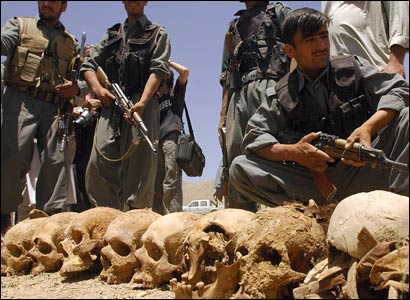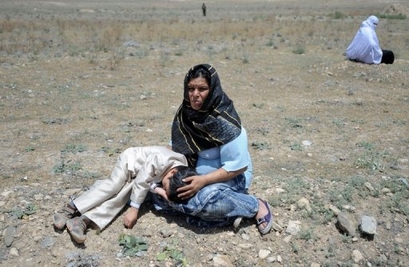By Karim Talbi

Afghan women hold a portrait of a dead relative at a mass grave on the outskirts of Kabul. As President Hamid Karzai prepares to host a peace conference later this month to discuss how to tackle the brutal Taliban insurgency, victims of the violence blighting Afghanistan complain their voice is not being heard. (Photo: AFP/Massoud Hossaini)
PUL-E-CHARKHI, Afghanistan — Sayed Ali Attayii lost four uncles during more than 30 years of war in Afghanistan, two under the communist regime of the 1980s and two at the hands of the Taliban.
The 30-year-old says no one has ever been brought to justice for their deaths, something he believes must come before a planned government drive to make peace with the Taliban militants laying siege to his country.
As President Hamid Karzai prepares to host a peace conference later this month to discuss how to tackle the brutal Taliban insurgency, victims of the violence blighting Afghanistan complain their voice is not being heard.
"I want peace in my country, but peace will only be possible if those who have brought death to our country are tried," said Attayii, one of dozens of people who gathered at a mass grave on the outskirts of Kabul this week.
"All I want is for justice to be done, for the perpetrators of these crimes to be tried," he told AFP.
[utube]LD4vgVvH24w[/utube]The gathering at Pul-e-Charkhi, site of a mass grave for victims of the violence that followed a 1978 communist coup, was part of a three-day "victims' jirga," or meeting, held this week to give a voice to ordinary people.
It was organised by the Transitional Justice Coordination Group, a local human rights organisation that believes peace in Afghanistan will only be possible once the perpetrators of past crimes have been brought to justice.
"Afghanistan is a land of victims and I don't want the next generation to be buried as ours has been," said the group's president, Bisharat, who uses just one name.
"Reconciliation is not possible without justice," added Bisharat, calling for open and transparent hearings for armed groups and an end to Afghanistan's "culture of impunity".
At the end of 2006 President Hamid Karzai signed a "Peace, Reconciliation and Justice Action Plan" seeking to establish accountability with the potential to lead to the trial of those responsible for war crimes.
But the South African-style plan remains unfulfilled as rights groups accuse the government of being unwilling to take action.
The situation is complicated further, experts say, by the presence in government of many figures who played an active role in recent conflicts and who many Afghans feel have a vested interest in continued silence.

According to the New York Times on least three separate occasions, members of the Bush administration foiled attempts to investigate a mass killing, and dumping of thousands of bodies in a mass grave, that happened in Afghanistan in 2001. (Photo: BBC)
Warlords in the government
"There is no willingness from the Afghan government to establish justice and take action against people who committed these crimes," said Nader Nadery, commissioner of the Afghan Independent Human Rights Commission (AIHRC).
"The government doesn't feel strong enough to face its past. There is a feeling in the government that these warlords will pose a threat to the stability of the government, which is a wrong perception," he said.
Ignoring warnings from NATO, the United Nations and the United States, Karzai chose Marshal Mohammad Qasim Fahim, a notorious warlord, as his vice president before the August presidential election which he won.
Fahim and other strongmen such as General Abdul Rashid Dostam, military chief of staff of the armed forces and a powerful Uzbek warlord, are accused of committing serious crimes against humanity during Afghanistan's civil war.
The AIRHC has established Afghanistan's first war crimes museum on the site of a mass grave outside Faizabad, in northeastern Badakhshan province.
The group has registered more than 100 mass graves, some of them containing up to 1,200 bodies, under a programme launched in 2007.

An Afghan mother, who lost relatives in Afghanistan's war, cradles a child at a mass grave on the outskirts of Kabul. As President Hamid Karzai prepares to host a peace conference later this month to discuss how to tackle the brutal Taliban insurgency, victims of the violence blighting Afghanistan complain their voice is not being heard. (Photo: AFP/Massoud Hossaini)
Nadery concurs with official figures that 1.5 million civilians and combatants have lost their lives since 1978, though he said that the number of people who have been wounded, tortured or otherwise harmed is much higher.
The mujahideen victory in 1992 over the pro-Moscow regime marked the start of the 1992-1996 civil war that led ultimately to the rise of the Taliban.
The United Nations estimates that more than 80,000 civilians died in the conflict which was concentrated in Kabul, a city that still bears the scars.
'No peace without justice'
After US-led troops in 2001 overthrew the Taliban regime, which took over amid the chaos of the 1990s civil war, an ensuing insurgency has left thousands of civilians dead.
Karzai has long been keen to hold talks with senior Taliban leaders in an effort to quell the violence that is crippling his country, where the United States and NATO are boosting their troop numbers to 150,000 by August.
He has secured Western funding for a plan to offer money and jobs to tempt Taliban fighters, and is reportedly proposing to offer leaders of the group exile if they agree to lay down their arms.
The plan is part of a radical peace and reintegration programme to be presented to tribal leaders at a peace conference, or "jirga," of more than a thousand tribal and political leaders from around Afghanistan on May 29.

Afghan women who last their relatives in Afghanistan's wars cry at a mass grave on the outskirts of Kabul. As President Hamid Karzai prepares to host a peace conference later this month to discuss how to tackle the brutal Taliban insurgency, victims of the violence blighting Afghanistan complain their voice is not being heard.(Photo: AFP/Massoud Hossaini)
But victims of the violence say they have not been consulted.
"It is not for Karzai to decide that these killers should be pardoned," cried one Afghan woman as she knelt by the mass grave in Pul-e-Charkhi.
"If his son was buried here, he would have the right. As things are, it is for we, the families of the victims, to decide."
Others, however, appeared more sympathetic -- among them Noor Mohammad, who was opening up his small shop in Kabul in 1981 when battles broke out between Soviet forces and mujahideen guerrillas.
Nine bullets hit his left leg and a rocket blast destroyed his hearing. Now he struggles to feed his four children by selling cigarettes from a tiny street stall.
"You cannot undo what has already been done," he said. "All this happened decades ago. Now we must make peace."



